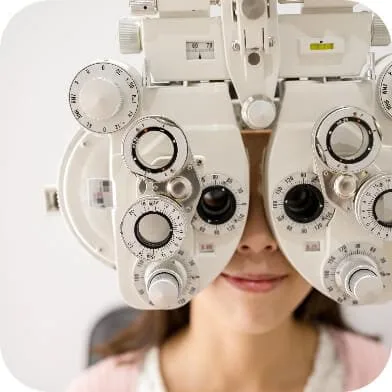Special Interest Mobile Healthcare: Vision

Vision mobile healthcare clinics can provide a range of vision care—from screenings, full eye exams and eyeglass dispensaries to interventions for those at risk of going blind—depending upon their funding source, goals and mission.
Goals
- Deliver vision care for individuals in vulnerable populations and communities, many of whom face significant barriers to treatment.
- End preventable blindness.
- Provide low- or no-cost corrective eyeglasses (only applies to some clinics).
- Connect individuals with long-term vision care.
Considerations
Establishing trust: Many mobile clinics find that partner organizations are the fastest and most efficient way to establish trust. Added bonus: Local partners can help identify individuals most in need of care before the mobile clinic visit. Another shortcut is to utilize local volunteers—even high school students—who can help check in patients, fill out paperwork and do vision screening. These local agencies can also act as the first-point-of-contact for questions or concerns after the event.
Program structure: Determine whether you will have partners or go it alone, and whether you will move from site to site or established fixed parking locations.
Logistics: If you are attending external events, each is different so plan ahead with each for maximum efficiency and impact. Advance site visits allow mobile clinics to determine set up, identify language needs and even recruit volunteers. Another tip: Give your clinic an “out” in the contract so that you will not be held liable should you need to cancel for crisis work or other reasons.
Referrals: If patients will need follow-up or long-term care, provide names and contact information of the healthcare providers. Some mobile clinics do this research themselves and others hold community partners responsible for facilitating the follow up care. Depending on your organizations you may also have to consider CMS inducement restrictions related to managing referrals.
Glasses: Frames and lenses are expensive. Some mobile clinics create and dispense glasses on the same day; others work out partnerships with low or no-cost glasses providers and connect with community partners to distribute later; and still others do not focus on vision correction.
Laws: Laws around vision care vary greatly from state to state—for example, in Florida you must dilate the eye and in New York, an optician must dispense glasses. Determine how those laws will impact program needs beforehand, especially if your mobile clinic is crossing state lines.
Pediatrics: Some states provide free screenings or vision care for children. This may impact the need for pediatric vision care.
Costs: Equipment costs vary greatly, depending upon the type of care provided, but the highest spend could be as much as $100,000. Also, one mobile clinic’s vehicle wrap was $17,000, so factor in wants and needs on the external look as well.
Staffing: Depends significantly upon the type of care provided. A doctor may or may not be necessary—depending on the services—and can be hired from within the community or recruited as volunteers. Almost every mobile clinic in this space requires a driver who is willing to be multifunctional, e.g., with proper training almost anyone can help pre-test, make or dispense glasses, etc.
Location: Many individuals in vulnerable communities are resistant to leaving their neighborhoods, so find a location that is easily accessible to those you want to serve. Community partnerships will also be helpful here. Also consider the accessibility of the location as many of those served by mobile clinics may experience mobility limitations.
Resources
- VSP Mobile Eye Care Clinics
- Mobile Health Map
- The scope and impact of mobile health clinics in the United States: a literature review
Next Steps
- Become a member of Mobile Healthcare Association
- Join the Vision Special Interest Group
- Review our start-up resources, some for members only.